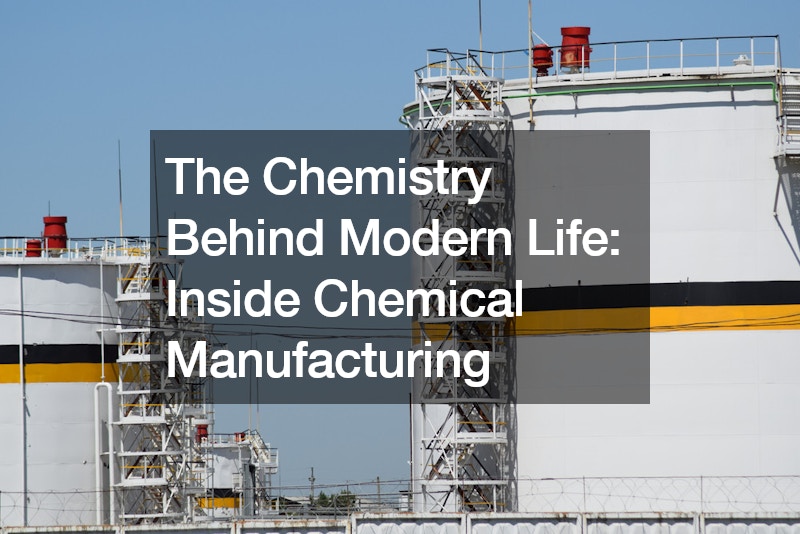In modern life, chemistry plays a pivotal role, shaping the world around us in ways often unseen but profoundly impactful. From the clean water we drink to the life-saving medicines we rely on, chemical manufacturing is the silent engine driving the production of essential goods that sustain our daily lives. In this blog, we’ll uncover the science behind its operations.
Foundations of Chemical Manufacturing
Chemical manufacturing is not merely about mixing compounds in a lab; it is a sophisticated process rooted in the principles of chemistry, meticulously designed to transform raw materials into valuable products. At its core, chemical manufacturing involves harnessing the power of chemical reactions, often facilitated by specialized equipment and controlled environments.
Moreover, the foundations of chemical manufacturing extend beyond the laboratory setting to encompass a broad spectrum of disciplines, including engineering, physics, and materials science. From the conceptualization of new processes to the optimization of existing ones, chemical manufacturers leverage interdisciplinary expertise to drive innovation and enhance efficiency. Advanced computational modeling and simulation techniques enable scientists and engineers to predict the behavior of complex chemical systems, paving the way for more sustainable and cost-effective production methods.
Utilization of Raw Materials
One of the fundamental aspects of chemical manufacturing is the utilization of raw materials such as natural gas and oil. These materials serve as the building blocks for a myriad of chemical compounds that find applications across various industries. Through a combination of heat, air, water, and catalysis, these raw materials undergo chemical transformations, giving rise to essential products that form the backbone of modern society.
The Manufacturing Process: Behind the Scenes
The manufacturing units within chemical plants are the heart of the production process. These facilities are equipped with specialized reactors designed to facilitate controlled chemical reactions. Whether it involves hydrocarbon cracking or the synthesis of complex molecules, these reactors operate under meticulously controlled conditions. Each manufacturing unit represents the culmination of precision engineering and scientific expertise, ensuring the reliable production of high-quality chemical compounds essential to various industries.
In addition to reactors, chemical manufacturing units often feature ancillary equipment such as distillation columns, separation units, and purification systems. These components work in concert to refine and purify the products of chemical reactions, ensuring that the end result meets the strictest quality standards.
Infrastructure: Piping Systems and Control Rooms
Piping systems crisscrossing throughout the plant facilitate the movement of raw materials and finished products, ensuring seamless operations. These intricate networks of pipes, pumps, and valves serve as the lifeline of chemical manufacturing, transporting substances under varying pressures and temperatures with precision and efficiency. Within this complex web of pipelines, ensuring optimal performance and integrity is crucial. This is where pipeline pigging services come into play. By employing specialized devices known as “pigs,” these services help clean, inspect, and maintain pipelines, ensuring smooth and uninterrupted operations.
Within the control room, operators monitor and manage the complex processes within the plant. Through advanced instrumentation and control systems, these operators ensure that operations remain within prescribed safety limits and quality standards. Beyond their role in ensuring operational safety and efficiency, control room operators also contribute to continuous process improvement. By analyzing data trends and performance metrics, they identify opportunities for optimization and efficiency gains, driving ongoing enhancements to plant operations and productivity.
Safety Measures: Ensuring Operational Integrity
Safety is essential in the realm of chemical manufacturing, and rigorous protocols are in place to prevent incidents and mitigate risks. Process safety measures, developed by chemical engineers, are implemented to manage the flow of energy and control hazards such as excess heat and pressure. These measures encompass everything from facility design and operational procedures to maintenance schedules, ensuring that safety remains a top priority at all times.
Moreover, employee training programs emphasize hazard recognition, emergency response procedures, and best practices for accident prevention. Regular safety audits and inspections are conducted to identify potential hazards and ensure compliance with regulatory requirements.
Emergency Response: Preparedness and Coordination
Despite the meticulous precautions, accidents can still occur, underscoring the importance of comprehensive emergency response plans. From notifying local authorities to coordinating with emergency responders, chemical manufacturers are prepared to spring into action should the need arise. Continuous training and regular drills ensure that personnel are well-equipped to handle emergencies effectively, minimizing the impact on both personnel and the surrounding community.
Community Engagement: Building Trust and Transparency
Community involvement is another crucial aspect of chemical manufacturing, fostering transparency and trust between industry stakeholders and the public. Through initiatives such as local emergency planning committees and community advisory panels, chemical manufacturers engage with residents to address safety concerns and build resilient communities.
In conclusion, chemical manufacturing is the backbone of modern life, providing essential products that enrich and sustain our daily lives. By embracing rigorous safety standards, fostering community engagement, and embracing continuous improvement, the chemical manufacturing industry continues to uphold its commitment to innovation.
.


